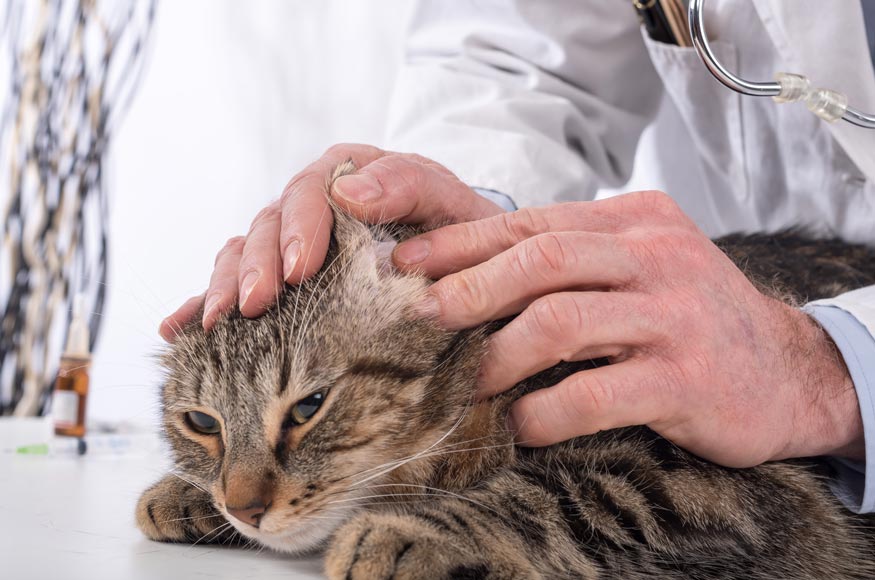Ear Infections in Cats

Cats don't suffer from ear infections as often as dogs do. In fact, ear infections caused by water in the ear canals or presenting without another inciting factor are relatively rare in cats.
Outer Ear Canal Infections in Cats Are Usually Secondary
When cats have an ear infection, it's usually secondary to another condition. The most common of these primary conditions are:
- Ear mites
- Allergies, especially to food or inhalants
- Foreign body lodged in the ear canal
- Tumor or polyp in the ear canal
- Thick hair around the opening of the ear canal, decreasing air flow
- FELV or FIV infection, resulting in a weakened immune system
Signs of Ear Infections in Cats
If a cat has an outer ear canal infection, she might display the following signs:
- Shaking the head incessantly
- Scratching at the ears with back paws more than usual
- Rubbing the face and ears on the ground or carpet
- Visible discharge just inside the ear canal
- Foul odor from the ears
If an infection makes its way past the eardrum into a cat's middle or inner ear, additional signs will include:
- Head tilt to one side
- Nystagmus, or rhythmic movement of the eyes, usually from side to side
- Vomiting
- Stumbling due to dizziness
- Decreased or absent appetite
Diagnosis of Ear Infections in Cats
Once your veterinarian has taken a thorough history from you about what you've noticed your cat doing, for how long, and anything that might have occurred just before the signs developed, he or she will do a physical exam. Part of that exam will include specifically examining the ear visually, then looking into the canal with an otoscope.
If there is discharge present in your cat's ear, the vet might need to clean it out to get a better look at the canal and make sure the eardrum isn't ruptured. The doctor will also collect a sample of the discharge to look for ear mites under the microscope and/or to prepare a slide for an ear cytology.
In rare cases, general anesthesia might be required for the veterinarian to get a good look at the ear canal, clean it, and get good samples. This is especially common if the ear is quite painful.
Treatment of Ear Infections in Cats
It's crucial that you take your cat to the vet at the first sign of an ear problem. If left untreated, an outer ear infection can easily result in a ruptured eardrum and issues with the middle and inner ears. A painful ear hematoma can form in the skin of the ear from the trauma of the kitty shaking her head violently or scratching the ear aggressively.
Don't try to treat a feline ear problem at home with over-the-counter cleaners or mite medications because you could easily make the situation worse. If the eardrum is ruptured, some cleaners and medications can cause toxicity and death.
Once your veterinarian has diagnosed the infection and determined what type of organism (usually bacteria, yeast, or a mix of those) is involved, he or she will develop a treatment plan. Additionally, any primary inciting cause for the ear infection must be diagnosed and treated. Treatments might include:
- Topical medications into the ear canal. These may consist of antifungals, antibiotics, anti-inflammatories, and anti-ear mite medication.
- Injectable or oral medications if a middle or inner ear infection is diagnosed.
- Grooming if overgrowth of fur contributed to the problem.
- Surgical removal of any polyp or tumor found in the ear canal.
- Ear cleaning at regular intervals. Be sure to use only the cleaner your vet recommends and not until after the eardrum is verified to be intact.
- Medications for allergies if necessary.
Your vet is likely to schedule a recheck visit for your cat so he or she can verify the treatment has completely resolved the issue and to develop a long-term maintenance plan if necessary.
You May Also Like These Articles:
Common Causes of Ear Problems in Cats
Skin Culture and Sensitivity Testing in Cats
Why Does My Cat Pull His Hair Out?
Notice: Ask-a-Vet is an affiliated service for those who wish to speak with a veterinary professional about their pet's specific condition. Initially, a bot will ask questions to determine the general nature of your concern. Then, you will be transferred to a human. There is a charge for the service if you choose to connect to a veterinarian. Ask-a-Vet is not manned by the staff or owners of CatHealth.com, and the advice given should not delay or replace a visit to your veterinarian.






